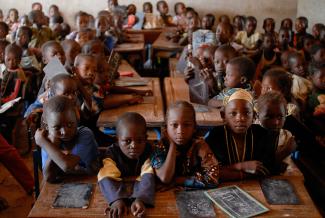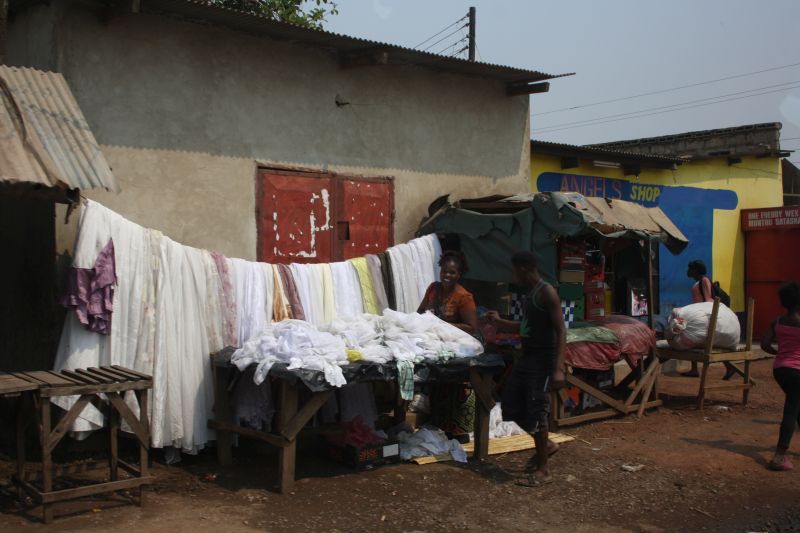Development assistance
EU scores high

2015 is a critical year for global development. The Millennium Development Goals (MDGs), agreed back in 2000, will reach their deadline. With eight clear-cut goals, which range from eradicating extreme poverty to halting the spread of HIV/AIDS and providing universal primary education, the world had broken down the challenge of eliminating poverty into manageable chunks. It allowed both African nations and their partners in the global north to focus on certain objectives over the course of 15 years.
This approach has led to incredible results: For the first time in history, more people got access to AIDS treatment than people were newly infected with HIV. Child deaths decreased by 49 % from 1990 to 2013, and the number of people going hungry went down by 100 million over the past decade. Overall, the proportion of people worldwide living in extreme poverty has been halved since 1990.
These successes are not entirely the result of development assistance though. In fact, in sub-Saharan Africa an average of 78 % of development financing comes from the countries’ own budgets. Nevertheless, international aid has played an undeniably critical role in the poorest countries in Africa and elsewhere. The European Union (EU) as a whole is the world’s largest provider of development assistance including loans and grants, with the EU institutions alone being the third biggest.
The difference that European assistance has made particularly in Africa is profound. There are several reasons for its success. As a multilateral donor, the EU typically handles large budgets which can have large impacts. Its umbrella function allows it to further leverage what the EU member states have to offer. In this way the EU development assistance has contributed to impressive outcomes such as connecting more than 70 million people to drinking water between 2004 and 2012 and enrolling 13.7 million children in primary education.
Unique partnership
What sets the EU apart from other development partners, is the unique partnership it has with African, Caribbean and Pacific (ACP) states. The Cotonou Agreement, a legally binding treaty signed in Benin in 2000, governs the general terms of development cooperation between the two blocks. Based on the premise of equal partnership, African countries and the EU agree together on two to three sectors in which the EU invests its development funds. As a result, the EU sometimes funds large infrastructure projects, or it supports a government’s plans directly by providing budget support to supplement its domestic funds. ACP-EU-negotiations take place every seven years, enabling African governments to map out how they want to strengthen certain areas like their health or education system over time.
The EU still grapples with improving the effectiveness of its development assistance. However it consistently scores well in regard to transparency – an important element that helps African countries to work together in an open, comprehensible way.
In spite of formidable collective efforts, some of the MDGs have not seen much progress. One of the issues that need more attention is maternal mortality. Almost 300,000 women died in 2013 from causes related to pregnancy and childbirth. Eighty percent of those deaths could have been prevented if all women had access to basic health services. And when we look at progress not by global average but broken down to individual countries, we see that some countries lag far behind in reaching the commonly agreed targets. This is the case in some African countries.
2015 is such an important year because the international community will agree on a new set of goals in order to pave the way for eliminating extreme poverty by 2030, called the Sustainable Development Goals (SDGs). This time, the targets will be universal, applying to both rich and poor countries. Every stakeholder should apply the lessons learnt from the MDG process in the course of the coming 15 years. One of those lessons is that progress is hard to accomplish in the world’s poorest countries. More and better development assistance is needed there.
African economies growing
Fortunately, official development assistance (ODA), will play an ever lesser role. African countries are generating their own revenues: in 2013, sub-Saharan Africa’s economy grew more than the global one. Yet today developing countries are still loosing a trillion dollars per year as a result of corruption or tax evasion. Without financial transparency, revenues will not be collected in a proper way – and thus will not be available for the development of the country. In the past, backroom deals in the oil and mining industries, for example, led to public funds being siphoned off. No one even knew how much money was lost.
In countries where citizens insisted on a publication of payments between their governments and extractive companies, governments can now be held accountable for using the revenues for development. In Ghana, social spending increased by 16 % in 2012 after joining the voluntary Extractive Industries Transparency Initiative. Two years ago, the EU contributed to this new way of doing business by setting its own house in order. It passed laws obliging European oil, gas, mining and logging companies to publish the payments they make to governments in their countries of operation.
The EU has understood the value of such legislation, which has the potential to make a huge difference in Africa. However these laws are not strictly part of the EU’s development policy, and there are many examples of weak EU policies that could and should be modified to benefit African economies more. Thinking out of the box will be crucial to achieve the new SDGs.
In July, Addis Ababa will host the Third International Conference on Financing for Development. There, countries will agree on a host of measures to finance the new set of goals, ranging from development assistance to trade and investment and to mobilising domestic resources. The meeting provides a great opportunity for the EU to show leadership and stand by African countries. In order to help us clamp down on tax evasion, the EU should make its country-by-country reporting rules for extractive companies binding for all multinational companies based or listed in Europe.
EU development cooperation has made a phenomenal difference so far. This year will set the tone for how the countries of the world will continue this journey together.
Sipho Moyo is the Africa executive director of the international campaigning and advocacy organisation The ONE campaign.
idriss.nassah@one.org











